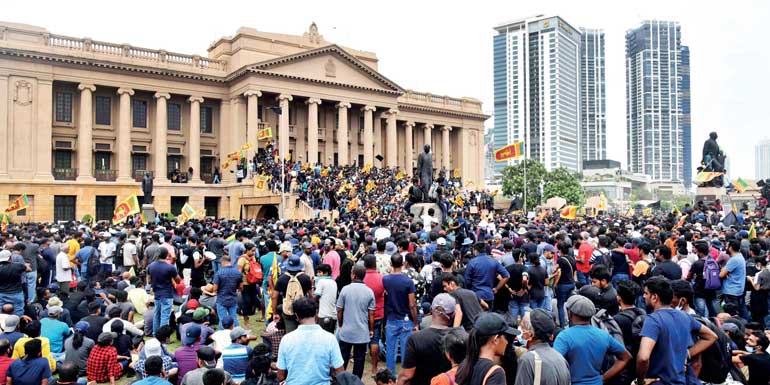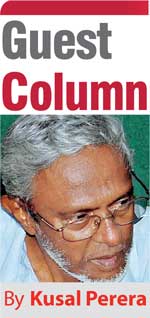Monday Feb 16, 2026
Monday Feb 16, 2026
Wednesday, 5 April 2023 00:02 - - {{hitsCtrl.values.hits}}

Right to protest and even demand change of government was what the middleclass enjoyed without restrictions a year ago, when they participated and sponsored the #GotaGoHome campaign. Their political stand quite rightly was democracy in society cannot be and should not be tampered with
 This “31 March” protest at Mirihana to celebrate protests one year ago at Mirihana as the first opening for “Aragalaya” against Rajapaksa rule, completely ignored the first stone by Hirunika Premachandra and her small group of women who sat before President Gotabaya Rajapaksa’s (GR) private residence in Mirihana on 5 March 2022. Hirunika’s sit-in no doubt proved GR’s façade can be penetrated with little effort and led to later protests including the 31 March protests at Jubilee Post, now fêted as forerunner to all protests. For Hirunika that was an instant lift to political stardom. But with #GotaGoHome campaign gathering momentum in Galle Face Green, her scattered protests could not keep her in the limelight for long.
This “31 March” protest at Mirihana to celebrate protests one year ago at Mirihana as the first opening for “Aragalaya” against Rajapaksa rule, completely ignored the first stone by Hirunika Premachandra and her small group of women who sat before President Gotabaya Rajapaksa’s (GR) private residence in Mirihana on 5 March 2022. Hirunika’s sit-in no doubt proved GR’s façade can be penetrated with little effort and led to later protests including the 31 March protests at Jubilee Post, now fêted as forerunner to all protests. For Hirunika that was an instant lift to political stardom. But with #GotaGoHome campaign gathering momentum in Galle Face Green, her scattered protests could not keep her in the limelight for long.
Galle Face #GotaGoHome campaign was one the urban middleclass conspicuously identified themselves with in April 2022. A month or two after they initiated protests on LP gas crisis, fuel shortages and power outages that disrupted their comfortable lifestyle. Though the Galle Face tagline was anti-GR, its campaign content was more anti-MR. Fiercely targeted at Temple Trees, his resignation from premiership on 9 May, brought the #GotaGoHome campaign to a jubilant finale. Urban middleclass gradually slipped out of Galle Face thereafter with a silent satisfaction after Ranil Wickremesinghe was sworn in as PM on 12 May 2022. “Aragalaya” was thereafter the new coinage for the next phase of the protest campaign pulled out of Galle Face on to city streets by Frontline Socialist Party and its student outfit the Inter University Student Federation (IUSF) in competition with the JVP.
What did Aragalaya leave for people when it finally splintered into isolated insignificance with President Wickremesinghe’s crackdown? Aragalaya brought the single UNP member in parliament, Ranil Wickremesinghe as the Executive Head of State and Government, with the Western power bloc backing him on IMF negotiations. A promise US Ambassador in Colombo Julie Chung made in her official tweet wishing Wickremesinghe as the new PM on 9 May. US promise for support apart, some claims by SLPP economists that 6.9 million people voted against any deals with IMF when they voted for GR’s election manifesto is only a hollow argument. Political parties formulate election manifestos with colourful promises, they themselves never discuss within their own organisations that know nothing about democracy. These election manifestos gain no public attention and never gain any relevance in people’s choice of the vote.
All that defines the quality of the parliament people elect. 92 years since using the franchise to elect the first State Council in 1931, people have no clue yet about using the vote to elect a government for good governance, accountability, democracy and socio-economic development. In 2020, MPs from north and east were voted in by people who over the past two decades have turned out en bloc as “anti-Rajapaksa”. All others in the political south were voted as “Sinhala Buddhist” representatives whatever the political party. Within that racist ideology the vote had three major affinities. One, anti-Rajapaksa but not anti-racist. Two, collective caste affiliations and three, selfish personal benefits. Those who were after sand or liquor permits, construction contracts and numerous other personal benefits while in urban middleclass it is long-term consultancies, director board appointments, chairmanships, foreign postings, etc.
Such is no constituency that could ever elect a decent, competent parliament. No constituency that knew they should elect a majority in parliament for a government with a vision and a mission based on democratic principles, transparency and accountability would have elected this calibre of a parliament. Nor did the Aragalaya with its youthful vociferous claims for “system change” ever lead to changing the semi feudal mindset of the voter during the past year.
Where has that left us with a President who firmly believes his compromise with the IMF is the only way out of the economic crisis? His liberal economic perception, a fine-tuned version from his 2002 “Regaining Sri Lanka” program now spells out investor freedom in a classic free trade market with a growing urban middleclass. A liberalising that aims at atomising society while fast increasing inequality in income and wealth distribution, leaving no space for collective dissent and protests explained and promised as “social stability”. That despite what IMF rhetoric is about on social security for poor and the vulnerable and with no reforms for democratic governance.
This economic model breeds a new generation middleclass ethically and morally different to the conservative urban middleclass of the pre 1978 economy. Social values and attitudes of this new middleclass has degenerated into selfish survival with unbridled consumerism. It was shamelessly spelt out by urban middleclass professionals in their “alternate tax proposals” when they argued, they need to have excess money in their wallet for savings and spending, for there is a substantial percentage in lower social segments who benefit from the trickledown effect of this middleclass market economy.
Far worse is the campaign especially by Colombo urbanites who are into numerous collectives to back the IMF program as “the only answer” for the crisis we are in. They cannot be aware of this whole program except through “selective leaks”, that even the parliament is still not informed about in every detail. No complete document/s detailing the IMF Extended Fund Facility (EFF) assistance and the agreement approved by the IMF Executive Board has been published in Sinhala and Tamil for public knowledge. What is discussed in urban circles are “tax reforms, privatisation of SOEs, new CBSL Act, and few structural reforms” that the government has initiated implementing in staggered measures.
Of them, protests against tax reforms by professionals are accepted as necessary to pressure the Government to reconsider “alternatives”. But protests against “privatisation” they demand should be “nipped in the bud” because the urban middleclass have decided privatisation in any form is the only right answer and workers have no right to decide otherwise.
These urban middleclass campaigners who provide the license to sell SOEs, anchor themselves on the flat statement, “we don’t have to waste taxpayer money on loss-making, inefficient State enterprises”. They do not accept the fact failure of SOEs is not in that “business model” but in corrupt, inefficient governments using SOEs for local political advantage. That mega corruption would not be, if not for the filthy rich in this free market economy.
They also don’t seem to know trillions or may be even quadrillions of rupees in tax money have been waved off by successive governments as incentives for FDIs during the past 40 years, without any forensic audit to ascertain what benefit the people have gained if any, other than the crisis we are now in. At least the 721 companies with BOI approval that put up shutters during seven years since 2010 (My article in Daily FT/27 March) have not been audited to check how much financial benefits and privileges they have enjoyed as against what people gained from their presence here. In simple language, in this part of the world from Vietnam through China to India and Sri Lanka, there is no private sector without State patronage. Even in the “developed world” during the 2008 global meltdown massive corporates had to be bailed out with taxpayer money.
The fact that Aragalaya has not changed the feudal, selfish mindset of the society and instead has provided greater social space for the urban middleclass to assert themselves on socio political issues is proof in how they oppose workers’ right to protest. Right to protest and even demand change of government was what the middleclass enjoyed without restrictions a year ago, when they participated and sponsored the #GotaGoHome campaign. Their political stand quite rightly was democracy in society cannot be and should not be tampered with.
“Democracy” enshrined in Article 14.1(a) (b) and (c) as fundamental rights of all citizens is what the urban middleclass enjoyed without restrictions when they came out on the streets demanding LP gas, fuel and electricity as essential for their daily life. When they followed those protests that gathered at Galle face green with protests against the Rajapaksa regime for failing the People. BUT – now this is worth challenging – that same “democracy” under the same Article 14.1 of the Constitution guaranteed in sub article (d) is what the urban middleclass now want the Wickremesinghe government to supress when workers protest against “privatisation” of State-Owned Enterprises (SOE). They want the Wickremesinghe government they oppose for using security forces and armed police to suppress protests and for using the PTA to arrest activists, to brutally crackdown on worker protests against privatisation.
We are now in an ego battle of contradictions. We demand economic freedom at the expense of democracy and fundamental rights. We demand privatisation under heavy repression but democracy for us. We oppose Wickremesinghe government for suppressing our democratic life, but live with suppression against people in north and east. Don’t we accept we are wholly derailed in our aspirations and in our pursuit of a decent, civilised nation that respects equality for all within a functional democracy? I believe we should start a new discourse on what democracy should mean for a decent society.